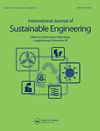A plithogenic based neutrosophic analytic hierarchy process framework to analyse the barriers hindering adoption of eco-innovation practices in supply chain
IF 3.6
Q3 GREEN & SUSTAINABLE SCIENCE & TECHNOLOGY
International Journal of Sustainable Engineering
Pub Date : 2021-11-02
DOI:10.1080/19397038.2021.1998842
引用次数: 6
Abstract
ABSTRACT Eco-innovations have become an essential component to attain sustainability in the supply chain. However, the process of transition from the traditional supply chain to an eco-innovative focused supply chain is faced with several challenges especially in the developing nations. Hence, this study is undertaken to evaluate the eco-innovation implementation barriers in the supply chain. A plithogenic-based neutrosophic analytic hierarchy process is used to determine the weight intensity of the barriers. Findings of the study indicate that lack of internal funds necessary to meet the extra cost and research and development cost are the major barrier in the adoption of eco-innovation initiatives. The other important barriers hindering the adoption of eco-innovation initiatives include the absence of complementary assets (such as infrastructure, standards), lack of collaboration agreements with other organisations, and high costs involved in the transition to new technologies. A manufacturing case industry is selected to apply the proposed framework. This study will help the industry experts/policy-makers to understand the important barriers hindering the adoption of eco-innovation initiatives.一个基于分裂基因的中性粒细胞层次分析框架,用于分析阻碍供应链中采用生态创新实践的障碍
摘要:生态创新已成为实现供应链可持续性的重要组成部分。然而,从传统供应链向注重生态创新的供应链过渡的过程面临着一些挑战,尤其是在发展中国家。因此,本研究旨在评估供应链中的生态创新实施障碍。使用基于分裂的中性粒细胞层次分析法来确定屏障的重量强度。研究结果表明,缺乏必要的内部资金来支付额外成本和研发成本是采用生态创新举措的主要障碍。阻碍采用生态创新举措的其他重要障碍包括缺乏补充资产(如基础设施、标准)、缺乏与其他组织的合作协议,以及向新技术过渡的高昂成本。选择一个制造案例行业来应用所提出的框架。这项研究将有助于行业专家/决策者了解阻碍采用生态创新举措的重要障碍。
本文章由计算机程序翻译,如有差异,请以英文原文为准。
求助全文
约1分钟内获得全文
求助全文
来源期刊

International Journal of Sustainable Engineering
GREEN & SUSTAINABLE SCIENCE & TECHNOLOGY-
CiteScore
7.70
自引率
0.00%
发文量
19
 求助内容:
求助内容: 应助结果提醒方式:
应助结果提醒方式:


